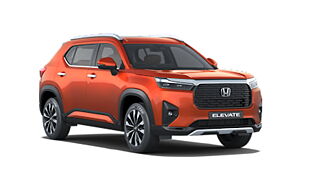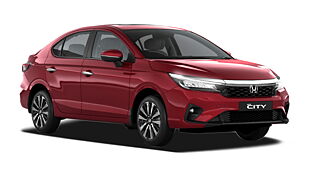Introduction

Diesel. It is what powers eighty per cent of new cars sold in India today, and diesel variants are proving not only more efficient, but quicker than their petrol counterparts as well. Honda, as a Japanese manufacturer, has never had a wide range of diesel engines, although there has always been a 2.2-litre four cylinder that was developed for the European market. However, that engine is too big for our requirements, as it was developed for the Accord and CR-V. The big H has recently launched a 1.6-litre diesel Civic in Europe, and that engine has given rise to the 1.5-litre i-DTEC that will power the Amaze. Welcome, then, to Honda’s first diesel for the Indian market. Will it be a winner as Hondas always have been?
Exterior
The Amaze looks proportionate in the flesh, unlike some of its images where it looks a little dumpy at the rear. The front is all Brio except for the grille, which has two large horizontal chrome bars in it. Move around to the front three-quarter view, and things change significantly. The wheels are different, the roofline is different, and you notice those two prominent creases that make up the shoulder line of this car.

From the side they are what grabs your attention, which is a good thing – the Amaze refuses to look boring, whether you like the way it looks or not. At the rear the tail-lamps are reminiscent of the City’s, and there is a large chrome strip that runs across the boot in much the way the Dzire and Scala have. Fit and finish is of a high order, and we like the new blue that the Amaze is available in. There is just a single panel gap, that between the boot lid and the tail lamp, that is large and ungainly in an otherwise perfect car.

Interiors

It is familiar, thanks to many elements being carried over from other Honda models. The audio system has been carried over from the City and not the Brio. The steering wheel has audio controls mounted on it as well. The driver’s seat in the top-end VX variants adjusts for height, and Honda claims that the 50mm difference between its highest and lowest setting is the biggest in its class. The seats themselves are comfortable, and the steering adjusts for rake.

The gearshift is standard Honda issue, the golf-ball tip good to hold. Rear legroom is surprisingly good, with a little extra kneeroom being offered by the scooped-out seat backs of the front seats. The rear is comfortable, and we appreciate that the rear doors also have bottle holders in addition to the pockets in both the seat backs of the front seats. If you’re a backseat person, you’ll love the Amaze for the sheer practicality it offers – you’ll have access to those seatback pockets, two bottle holders in the doors, one behind the handbrake, and two more cupholders in the pull-down armrest! Legroom is also contributed to by the 2405mm wheelbase, which has been increased from the Brio’s wheelbase.

The boot is another feature that will win customers over. Despite coming in at under four metres, the boot is a 400 litre one and most of it is usable, with minimal intrusions from suspension struts. Unfortunately, in the interest of saving cost, the rear seats don’t split or fold, but we can expect these features to get added once the car is manufactured in large enough numbers, either for domestic consumption or for export. The audio system is a competent unit, with small ergonomic adjustments like the USB connector being at the bottom of the console that makes life in a Honda so much easier.

NVH from either the petrol or diesel is very well controlled, with the petrol being completely silent at low revs and making a lovely noise at high revs. The diesel is on par with the competition (Honda attributes it to its all-aluminium construction, which makes it hard to contain noise and vibrations) but it never has so much noise that it becomes unpleasant.

The electrically adjustable mirrors also fold electrically, but don’t fold on the vehicle being locked like the Micra/Pulse do. There isn’t any climate control, but a very effective air-con is present, aided by a windshield that rejects heat. Everything feels up to scratch except for the new stalks mounted behind the steering wheel – the finish on the left one was especially bad, with sharp edges on more than one car’s left stalk. Still, that is a stalk that is used mostly during the monsoon, so most owners will not find that a problem.

Engine and transmission

Be warned, the petrol variants will be a small paragraph in this article: after all, you aren’t here to find out how refined or good the petrol is. You already know that, because it is the same engine that powers the Brio and Jazz. In fact, it even has the same power output of 88PS@6000rpm and 109Nm@4500rpm. The petrol will weigh 1005kg and 1010kg for the manual and automatic variants. Yes, the same five-speed gearbox from the Brio automatic is present in the Amaze. ARAI fuel efficiency figures are 18.0kmpl and 15.5kmpl for the manual and automatic respectively. It must be noted that the five speeds of the auto ‘box make it one up on the competition like the Dzire, which have only four speeds. Strangely enough, the AT has a larger turning radius at 4.7 metres, where the MT is 4.5 metres.

The diesel, then. Let’s start with a few facts: it has 100PS@3600rpm and 200Nm@1750rpm, figures that make it class-leading. Not only this, the 1498cc four-cylinder manages a torque curve that any sports car manufacturer will be proud of – it’s as flat as today’s car sales, and doesn’t drop off until the redline is near. There isn’t any high-tech malarkey behind this; the engine uses a DOHC four-valve setup coupled with a common-rail injection system that is capable of a maximum of three injections per cycle. The turbocharger is a fixed-geometry one supplied by Honeywell, and it isn’t a twin scroll one. The fuel efficiency is rated at 25.8kmpl, the highest in the country. Honda has also developed the world’s least viscous diesel engine oil for the Amaze diesel. It is a fully synthetic oil, but it will not cost as much as regular fully synthetic oil. Regular oil can also be used, but you can expect a fuel efficiency drop of five per cent with it. Oil changes have to be made every 10,000km or six months. Another surprising fact about this i-DTEC is its construction; it is an all-aluminium unit, which means that NVH is hard to control, but it weighs in at a featherweight 152kg.
This, then, is why Honda took so long to launch its diesel; they wanted to get it right the first time. And by the specs, it certainly seems like they have done so.
Ride and handling

The Amaze is biased towards handling rather than ride comfort, and that is something we appreciate. The diesel feels stiffer thanks to the extra weight in the nose. Suspension is par for the course with McPherson struts in the front and torsion beams at the rear. Brakes get a disc/drum setup, like the rest in the segment. Worthy of special mention is the gearshift; whether petrol or diesel , it will make you want to shift gears just for the sake of the low effort, and a lovely positive snick when it engages. The steering is electrically assisted, but feel and feedback is good. It isn’t as good as a hydraulic unit, but it is one of the better electric units we’ve driven. The brakes have good bite and progression, although on the narrow, twisty roads of Goa, the brakes of the automatic seemed to start fading after a while thanks to the lack of engine braking that can be had with the manuals.

The tyres are understandably biased towards fuel efficiency, but the MRFs present on our test car were surprisingly tenacious, and when grip transitioned to slip, it did so progressively and without drama. We’d certainly like to see how the Amaze performs when fully loaded, because the Civic and City have a habit of squatting at the rear with five passengers and a full boot. Honda assures us that the Amaze belly won’t scrape any speedbreakers because of the shorter wheelbase and the stiff suspension, but we’ll have to wait for a full road test to find out for sure.

Verdict

Is the Amaze truly amazing? We’d say yes, but there is one small matter remaining; that of the price. In this, the entry-level sedan segment, that is usually a deal breaker because customers aren’t brand loyal. On the other hand, Hondas have always commanded a premium, not just for their engineering, but because their sales and service is so good, they tend to retain customers. On the drive in Goa, a Dzire owner stopped to look at the Amaze and was suitably impressed. He was willing to pay upto Rs 60,000 over his Dzire to buy an Amaze, because, in his words, “It’s a Honda, after all.” Will the rest of the market feel the same way? More importantly, will Honda price it right? That is what will make or break the Amaze’s fortunes. We won’t have long to find out.
Edit: Honda has launched the Amaze at a starting price of Rs 4.99 lakh, ex-showroom, Delhi. The diesel VX variant you have read about on these pages costs Rs 7.60 lakh, ex-showroom, Delhi, making it really very competitively priced. Should you go get one if you're in the market for a small diesel sedan? Of course - it's the best thing in the segment right now. For more on prices, click here.

![Honda Amaze [2013-2016] Front View Honda Amaze [2013-2016] Front View](https://imgd.aeplcdn.com/642x361/ec/23/B1/10277/img/m/Honda-Amaze-(Brio-sedan)-Front-view-16302_l.jpg?v=201711021421&q=80)
![Honda Amaze [2013-2016] Rear View Honda Amaze [2013-2016] Rear View](https://imgd.aeplcdn.com/642x361/ec/23/B1/10277/img/l/Honda-Amaze-(Brio-sedan)-Rear-view-16308.jpg?v=201711021421&q=80)
![Honda Amaze [2013-2016] Rear View Honda Amaze [2013-2016] Rear View](https://imgd.aeplcdn.com/642x361/ec/23/B1/10277/img/ol/Honda-Amaze-Rear-view-16374.jpg?v=201711021421&q=80)
![Honda Amaze [2013-2016] Rear View Honda Amaze [2013-2016] Rear View](https://imgd.aeplcdn.com/642x361/ec/23/B1/10277/img/ol/Honda-Amaze-16354.jpg?v=201711021421&q=80)
![Honda Amaze [2013-2016] Rear View Honda Amaze [2013-2016] Rear View](https://imgd.aeplcdn.com/642x361/ec/23/B1/10277/img/l/Honda-Amaze-(Brio-sedan)-Rear-view-16342.jpg?v=201711021421&q=80)
![Honda Amaze [2013-2016] Rear View Honda Amaze [2013-2016] Rear View](https://imgd.aeplcdn.com/642x361/ec/23/B1/10277/img/l/Honda-Amaze-(Brio-sedan)-Rear-view-16341.jpg?v=201711021421&q=80)
![Honda Amaze [2013-2016] Rear View Honda Amaze [2013-2016] Rear View](https://imgd.aeplcdn.com/642x361/ec/23/B1/10277/img/l/Honda-Amaze-(Brio-sedan)-Rear-view-16335.jpg?v=201711021421&q=80)
![Honda Amaze [2013-2016] Rear View Honda Amaze [2013-2016] Rear View](https://imgd.aeplcdn.com/642x361/ec/23/B1/10277/img/l/Honda-Amaze-(Brio-sedan)-Rear-view-16311.jpg?v=201711021421&q=80)
![Honda Amaze [2013-2016] Image Honda Amaze [2013-2016] Image](https://imgd.aeplcdn.com/272x153/cw/cars/honda/amaze.jpg?q=80)























